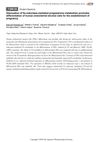 March 2016 in “European Urology Supplements”
March 2016 in “European Urology Supplements” Methylation in specific gene region causes finasteride resistance in some BPH patients.
March 2023 in “The Journal of Urology” Higher SRD5A2 expression predicts better response to finasteride in treating urinary symptoms.
 April 2024 in “The Journal of urology/The journal of urology”
April 2024 in “The Journal of urology/The journal of urology” SRD5A2 methylation in blood can predict how well someone will respond to finasteride treatment.
[object Object]  3 citations,
May 2021 in “Evidence-based Complementary and Alternative Medicine”
3 citations,
May 2021 in “Evidence-based Complementary and Alternative Medicine” Some traditional Chinese medicines may have anti-aging benefits and could help with hair growth, but more research is needed.
 1 citations,
December 2016
1 citations,
December 2016 Researchers created a model to understand heart aging, highlighting key genes and pathways, and suggesting miR-208a as a potential heart attack biomarker.
 September 2022 in “Annals of medicine and surgery”
September 2022 in “Annals of medicine and surgery” Three siblings with a rare genetic condition had abnormal sexual development and chose different gender identities, needing surgery and therapy.
June 2023 in “Journal of personalized medicine” Androgen treatment with dihydrotestosterone may help maintain height in patients with 5-α-reductase type 2 deficiency, especially before puberty.
 4 citations,
March 2020 in “Journal of Cosmetic Dermatology”
4 citations,
March 2020 in “Journal of Cosmetic Dermatology” Plumbago zeylanica extract helps hair growth and reduces a hair loss-related enzyme.
 January 2020 in “Nihon Yakuri Gakkai nenkai yoshishu”
January 2020 in “Nihon Yakuri Gakkai nenkai yoshishu” Reducing 5α-reductase activity helps endometrial cells differentiate, aiding pregnancy.
 883 citations,
August 2016 in “Nature Reviews Disease Primers”
883 citations,
August 2016 in “Nature Reviews Disease Primers” Polycystic Ovary Syndrome (PCOS) is a common condition in women that can cause metabolic, reproductive, and psychological issues, and requires lifestyle changes and medication for management.
 237 citations,
December 2001 in “Urology”
237 citations,
December 2001 in “Urology” Blocking the enzyme 5α-reductase can shrink the prostate and help treat enlarged prostate issues.
 136 citations,
May 2019 in “Cells”
136 citations,
May 2019 in “Cells” Stem cell therapy, particularly using certain types of cells, shows promise for treating hair loss by stimulating hair growth and development, but more extensive trials are needed to confirm these findings.
 124 citations,
July 2012 in “Archives of Dermatological Research”
124 citations,
July 2012 in “Archives of Dermatological Research” Targeting androgen receptors could be a promising way to treat skin disorders with fewer side effects.
 100 citations,
September 2017 in “Molecular and Cellular Endocrinology”
100 citations,
September 2017 in “Molecular and Cellular Endocrinology” Male hormones and their receptors play a key role in hair loss and skin health, with potential new treatments being explored.
 93 citations,
February 2009 in “Annals of the New York Academy of Sciences”
93 citations,
February 2009 in “Annals of the New York Academy of Sciences” 5α‐reductase isozymes are crucial for prostate development and health, and targeting them can help prevent and treat prostate issues.
 77 citations,
June 2006 in “Best Practice & Research Clinical Endocrinology & Metabolism”
77 citations,
June 2006 in “Best Practice & Research Clinical Endocrinology & Metabolism” The document concludes that accurate measurement of serum androgens is crucial for diagnosing hyperandrogenism.
 75 citations,
January 2014 in “Korean Journal of Urology”
75 citations,
January 2014 in “Korean Journal of Urology” 5α-reductase inhibitors can cause sexual problems, higher risk of aggressive prostate cancer, and depression.
 64 citations,
March 2017 in “Nature communications”
64 citations,
March 2017 in “Nature communications” Researchers found 63 genes linked to male-pattern baldness, which could help in understanding its biology and developing new treatments.
 47 citations,
January 2013 in “International Journal of Cosmetic Science”
47 citations,
January 2013 in “International Journal of Cosmetic Science” Hair diversity is influenced by complex genetics and environmental factors, requiring more research for practical solutions.
 35 citations,
April 2013 in “Sexual medicine reviews”
35 citations,
April 2013 in “Sexual medicine reviews” 5-alpha reductase inhibitors slightly increase the risk of sexual and mood side effects, and breast growth in men.
 21 citations,
April 2011 in “Physiological Research”
21 citations,
April 2011 in “Physiological Research” Normal levels of DHT can reduce belly fat and increase muscle, but too much can lead to hair loss, prostate issues, and possibly heart disease.
 15 citations,
October 2016 in “Steroids”
15 citations,
October 2016 in “Steroids” Researchers developed a new method to find substances in herbs that can block a specific enzyme linked to hair loss.
 11 citations,
July 2017 in “Expert Opinion on Investigational Drugs”
11 citations,
July 2017 in “Expert Opinion on Investigational Drugs” New hair loss treatments may include topical medications, injections, and improved transplant methods.
 11 citations,
February 2016 in “Current Medicinal Chemistry”
11 citations,
February 2016 in “Current Medicinal Chemistry” New treatments for prostate cancer and BPH show promise, including novel compounds that target hormone synthesis and response.
 11 citations,
August 2014 in “Current Urology Reports”
11 citations,
August 2014 in “Current Urology Reports” Medications for enlarged prostate can cause sexual side effects like reduced libido, erectile dysfunction, and ejaculatory problems.
 8 citations,
September 2008 in “Medical Hypotheses”
8 citations,
September 2008 in “Medical Hypotheses” The paper suggests that hair loss might be caused by skull growth, not just DHT's effect on hair follicles, and calls for more research.
 January 2009 in “Egyptian Journal of Medical Human Genetics”
January 2009 in “Egyptian Journal of Medical Human Genetics” The study suggests that a specific gene variation and higher gene activity are linked to increased baldness in Egyptian men.
[object Object]  82 citations,
May 2016 in “Best Practice & Research in Clinical Obstetrics & Gynaecology”
82 citations,
May 2016 in “Best Practice & Research in Clinical Obstetrics & Gynaecology” The conclusion is that managing androgen excess requires long-term treatment, including hormonal contraceptives and androgen blockers, with follow-up after six months.
 25 citations,
November 2015 in “Journal of Ethnopharmacology”
25 citations,
November 2015 in “Journal of Ethnopharmacology” Certain Chinese herbs, especially Cacumen platycladi, can promote hair regrowth and reduce hair loss-related hormone levels in mice.
 21 citations,
March 2013 in “Cancer Epidemiology, Biomarkers & Prevention”
21 citations,
March 2013 in “Cancer Epidemiology, Biomarkers & Prevention” Early-onset baldness is linked to a higher risk of aggressive prostate cancer in African-American men, especially before age 60.




























